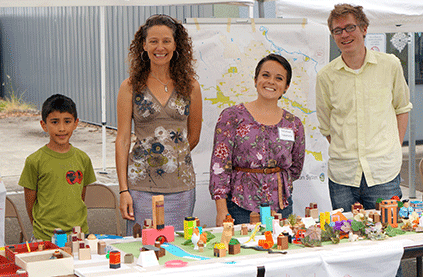Reprinted from the Winter 2016 edition of CLLAS Notes
Re-Thinking Open Spaces
CLLAS’s LCPP project is part of a team helping to make the City of Eugene’s Parks and Community Centers a more welcoming and inclusive place for its growing Latino population.
by Daniel Platt

Last spring, the City of Eugene initiated a public engagement effort—consisting of a series of community workshops and outreach events—with the goal of making the city’s parks and community centers more welcoming and inclusive for the Latino community. This outreach effort was organized and led by a team that included the City of Eugene’s Office of Human Rights & Neighborhood Involvement, coordinated by Lorna Flormoe; employees from the City of Eugene’s Parks and Open Space and Recreation Departments; students from the University of Oregon’s “Public Participation in Diverse Communities” class; Prof. Gerardo Sandoval from the Latino Civic Participation Project, sponsored by the University of Oregon Center for Latino/a & Latin American Studies; and James Rojas, a trained city planner and public engagement specialist. Together, this outreach team interacted with more than 400 people about what they like about the city’s parks and community centers and what they would change.
Students and staff conducted five different public engagement events in May 2015: at the monthly “Latino Family Fun Night” in Bethel, at the annual “Festival Latino” in Springfield (sponsored by Huerto de la Familia), at the entrance to Plaza Latina Supermarket on a busy Saturday afternoon, at Ganas, an afterschool program for Latino Kelly Middle School students, and at Pilas!, a Latino family literacy program run by the nonprofit organization Downtown Languages. Instead of hosting the events in city administrative buildings, which may feel unfamiliar or unwelcoming to participants, we chose venues that we believed would feel safe and inviting to the Latino community, such as Latino-owned businesses and schools that host programs for Latino youth and their families.
Our workshops and outreach events used a public participation model developed by artist and urban planner James Rojas. Mr. Rojas describes his method as one “that uses model-building workshops and on-site interactive models to help engage the public in the planning and design process.” In practice, this “participation through play” method inspires participants to think about the places where they live, work, and play, and how those spaces affect their daily lives. The method also encourages participants to tell stories about their lived experience of city parks and public spaces. Unlike other methods, such as community surveys, which produce a limited set of possible responses, this open-ended, informal approach is likely to generate more surprising—and, perhaps, more honest—community feedback. And because the engagement strategies don’t rely on representative maps or on the specialized language of city planning, Rojas’s method invites all community members to share their ideas and experiences, including children.
After collating the data and debriefing the results of our outreach, we identified two sets of recommendations to help make Eugene’s parks more welcoming to Latinos. First, we found that many of the participants in the workshops wanted parks that feel culturally inclusive, and where their desired uses for park space—for example, as a place to host large family gatherings—are actively encouraged through park design and management, rather than tacitly discouraged. One suggestion for fostering a sense of cultural belonging and inclusion would be to name a park or community center for someone with cultural significance to local Latinos. As one young participant observed during the Ganas Program Workshop: “If you really want to build more inclusive parks for Latinos, name one after a Latino leader.”
The second set of recommendations focused on creating more “informal” structures for managing park use. By allowing greater flexibility in park rules and regulations, the city can encourage imaginative and communal uses of parks that might otherwise be seen as unwelcome violations of the “officially sanctioned” park usage. For example, one participant in the Festival Latino Workshop remarked: “I used to play with a Latino team in a soccer league, but that just got too expensive.” Creating informal opportunities for people to play and socialize together can help community members avoid obstacles—like league fees—that might prevent them from enjoying the benefits of recreational spaces.
Social equity and the inclusion of diverse voices are both fundamental to the mission of Eugene’s Parks and Open Space and Recreation Departments. Now, with the 2015 update of Eugene Parks and Recreation Systems Plan (PRSP), the City of Eugene has a unique opportunity to make parks and public spaces more welcoming and accessible to the city’s growing Latino population. We will continue collaborating and advising the city staff as they reach toward those goals. For more information, or if you’d like to get involved in the discussion, contact Professor Gerardo Sandoval at gsando@uoregon.edu.
—Daniel Platt is an assistant professor of English at Graceland University and a former member of the PPPM team that put together the report for the City of Eugene.
